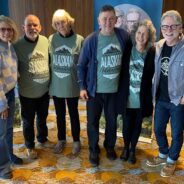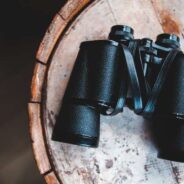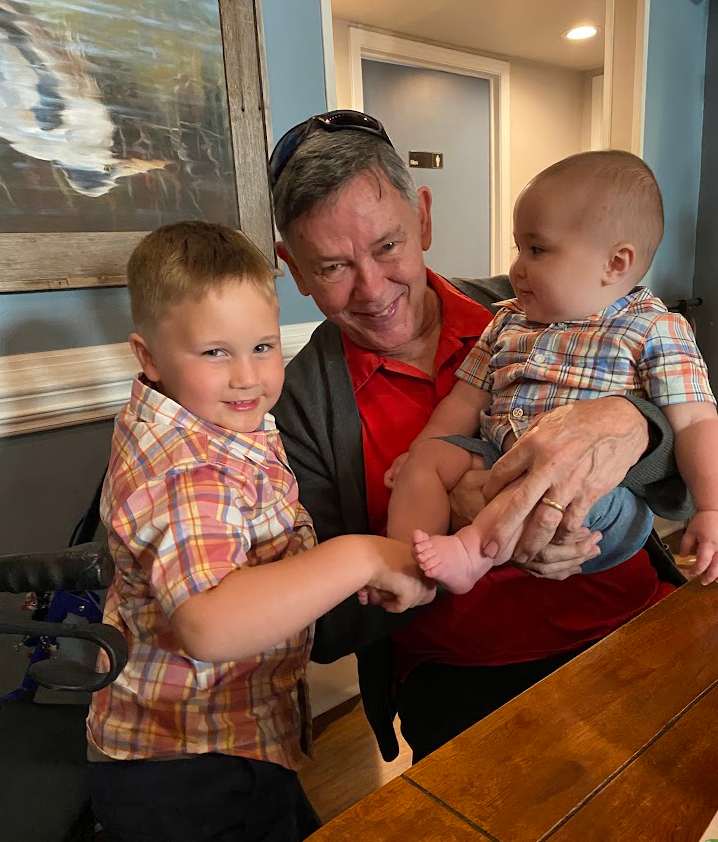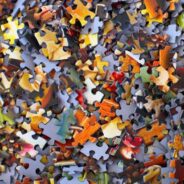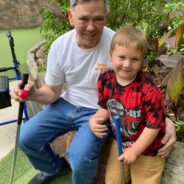Snapshots of Dementia: The Great Alaskan Adventure, Part 1
(L-R) Mary Beth Chapman, Hardy Lee, Barbara Winkler, Tom, Marti, Steven Curtis Chapman Our family loves music. Not just because Tom worked as a professional musician and worship pastor before he was living with dementia, although that has a lot to do with it. We can all name songs that meant a lot to us at various points in our family’s life—many of them from the contemporary Christian genre. One of the artists who has had a great impact on our lives is Steven Curtis Chapman, who also happens to be the most-awarded Christian music artist of all time. Tom and I have laughed, cried, and sung along with his music for much of our marriage; he released his first album the year our first two daughters were born, and his “Cinderella” played at the daddy-daughter dance for a family wedding. Just as his songs have accompanied our lives, they also became the soundtrack for our trip. The second listed below, which also features SCC, is by his longtime friend Geoff Moore and is also a family favorite. Enjoy and excuse the hairstyles! ‘The Great Adventure’ Because I knew Tom and I would celebrate our fortieth anniversary this summer, when I saw a magazine ad last fall for a week-long “Great Alaskan Adventure” cruise with Stephen Curtis and Mary Beth Chapman and friends (including Geoff Moore), an idea sparked. Could we? “I’ve always wanted to go to Alaska!” Tom said when I showed him the ad. The fact that he remembered the idea and mentioned it several days in a row also spurred me onward. Had I seen the ad a month or two earlier, I might not have had the courage to do anything about it. But our son’s own great adventure in taking his dad to an Ohio State football game last fall, along with our four daughters’ enthusiastic approval of the idea, gave me the courage to plan the trip. Whale watching in Juneau, Alaska For one full week in July, we had the incredible gifts of a mini-Christian conference with teaching from Scotty Smith, founding pastor of Christ Church, Franklin, Tennessee, and music from SCC and family/friends; the amenities of a luxury cruise ship; and the raw beauty of Alaska—including whale watching, a narrow-gauge railway ride up the White Pass and Yukon Route from Skagway, and gorgeous views of the Endicott Arm and Dawes Glacier—plus a guided bus tour of beautiful Victoria, British Columbia, complete with (for all my Canadian friends) a visit to Timmie’s! But wait. There’s more. ‘I’ve Got a Friend Like You’ We experienced many blessings during the trip, but the greatest came because of two sets of friends. One is a couple we’ve only known for a short time—in fact, they’ve only been a couple for a short time. Hardy Lee and Barbara Winkler, fellow members of our church, choir, and senior adult choir, were married this past December. Both were caregivers for their first spouses, now in heaven. When Tom learned of their upcoming nuptials, he offered to sing for their wedding. Not every couple wants a person LWD to take that role, but these two love Tom even more than they love music. I told them it might go well, or it might go just the opposite. “It’ll be fine,” Hardy assured me. And it...
read moreSnapshots of Dementia: What You Don’t See
(Unsplash) Marriage to someone who is living with dementia has taught me lots of things, many of which I’ve shared on this forum. I’ve learned about the disease, about the changing needs of people LWD, and about myself. I’ve also learned that, all along the way, there’s a lot those not in this situation don’t see—even when they spend time with someone LWD. This is true not because anyone is trying to hide or have secrets but simply because what we observe in a few minutes—or even a few hours—of anyone else’s life, LWD or otherwise, never gives us the whole picture. Even my snapshots of dementia, as transparent as I seek to be, are just that: snapshots, small glimpses, and usually from my own perspective. Although I’ve tried to give Tom’s perspective a time or two, that’s getting more and more difficult to share. Here, then, are some glimpses of what you do and don’t see (or would and wouldn’t see, if it were possible) when you see Tom and me: WHAT YOU DO SEE: Tom and Marti arriving at church, medical appointment, or another scheduled outing. WHAT YOU DON’T: The time it takes to get ready to leave. This includes last-minute bathroom trips or changes of clothes if he has spilled something along with finding sunglasses, reading glasses, sweater, and other necessary but often-misplaced items as well as (often) going back to close whichever door he exits and forgets to close. WHAT YOU DO SEE: Tom smiling and nodding, enjoying others’ company. WHAT YOU DON’T: Tom recalling fewer names and participating less and less in discussions because he can’t come up with quick responses. WHAT YOU DO SEE: Tom eating an unusually heavy meal, often with dessert. WHAT YOU DON’T: Tom’s lack of appetite control; he can eat a huge amount or very little without realizing what he’s doing or feeling either hungry or full. WHAT YOU DO SEE: Tom adding excessive amounts of salt, pepper, or both to his food. WHAT YOU DON’T: Tom’s dementia has stolen his sense of smell, which has diminished his sense of taste. As his dementia worsens, this seems to be worsening too. WHAT YOU DO SEE: Tom wearing a sweater, long sleeves, and long pants even when temperatures are in the eighties or nineties. WHAT YOU DON’T: Tom’s brain doesn’t process temperature well, and he is often cold. We keep a blanket in the car and a cardigan in the pouch on his walker to try to combat this problem. WHAT YOU DO SEE: Tom following behind me with his walker. WHAT YOU DON’T: Him becoming nervous and unsure where to go when I’m not in front of him. I used to stay behind to keep an eye on him, but now, that upsets him, so I either walk beside (when we have room) or directly in front of him and turn around often to check on him. WHAT YOU DO SEE: Beautiful photos of Tom smiling with our family, especially our grandchildren. WHAT YOU DON’T: The many times where he stares blankly into space or hyperfocuses on his iPad, ignoring everyone around him. WHAT YOU DO SEE: Tom continuing to sing in the adult and senior adult choirs. WHAT YOU DON’T: Him landing on the wrong page in his...
read moreSnapshots of Dementia: Living His Best Life
Tom with Lincoln and Lando, Father’s Day, 2023 When I made the decision to sell our home in the Orlando area and move to South Carolina to be near family, I often told people I hoped to “give Tom his best life.” At the time, I had little idea what that meant. So how do we give Tom his best life even while his brain continues to change? I’m still figuring it out. But here are some of the things that seem to help, despite many mistakes along the way. — ROUTINE: I’ve mentioned before how Tom can easily become agitated if too much of his routine changes. He likes to go out and enjoys being with friends and family, but he likes being home even more. We haven’t done much traveling since his diagnosis, but I’ve learned that trips go much better if I can keep mealtime, bedtime, and time for playing games on his iPad as close as possible to what we do at home. — FAMILY TIME: We spend most Friday nights with our oldest daughter and her family, who live nearby. Tom looks forward to this routine and especially to time with our two young grandsons. He also enjoys holidays, birthdays, and other family events. Earlier this spring, our youngest daughter blessed us with two week-long visits. And although our son hasn’t been here as much as he anticipated, every time he returns, Tom gives him a big hug and says how much he missed him. Relationships have always mattered to Tom, but while LWD, family seems to matter even more. — SOCIAL/SPIRITUAL: Attending church and singing in the choir and senior choir are becoming more challenging for Tom, but he still enjoys both. We stay active at church because it’s long been our priority and also because it’s a safe and healthy place for Tom. Friends there have consistently shown their concern for both of us, helping me get him safely from one place to another and making sure he’s not left out or left behind. I have long believed that those with cognitive challenges can still have a strong connection to God, and this holds true for Tom today. — DIET: I wrote here about some ways caregivers can stay healthy, and those choices have had an impact on Tom. I don’t experiment with new dishes too often; with his love for routine, familiar foods and longtime favorites make him happy. And although (with his doctor’s permission) I still ensure he has regular Wendy’s Frostys and other treats, I have shifted his diet to include more fruits, vegetables, and whole grains. Living his best life means staying as healthy as possible while his brain continues to change. — MEDICAL PROFESSIONALS: I can’t overemphasize the importance of a great health care team. Tom has developed other health issues alongside his dementia, so he sees some specialists in addition to his neurology team at the Emory Brain Clinic. The key piece, however, has been not the great neurological care but an excellent primary care physician. Our doctor has great insight into Tom’s dementia and shows concern for him as a person, not just a diagnosis. She also sees him once every three months, an extra reassurance for both of us. — COMMUNICATION: As Tom’s...
read moreSnapshots of Dementia: Life Is Hard
(Hans Peter Gauster, Unsplash) Life is hard, and it might not get easier.” Every one of our children knows this phrase well. While growing up, they often heard it from their dad (and eventually from each other as well as from me). It entered our lives as a line in an Amy Grant song, “We Believe in God.” Tom is living this reality now. Life with dementia is increasingly hard, especially in this year that has seen a steeper decline in his cognition and abilities. “What’s the hardest thing about living with dementia?” I asked him this morning. He had just misplaced his coffee mug and needed my help to find it, so although he hesitated, he had an answer. “Well, two things. First, I can’t remember where stuff is.” “Second …,” He gave one of his now-characteristic lengthy pauses, and after a couple of minutes had passed, I reminded him of the question. “Well, second (another long pause) … I’m sorry, I don’t remember.” “That’s OK, baby, I was just wondering what you thought. Is there something that really bothers you about having dementia?” “(Long pause) “If I think of something later, I’ll let you know.” I recently had to fill out a survey for an upcoming doctor’s appointment Tom has with the Brain Clinic at Emory University. It had to do with activities of daily living, a term health care professionals used to describe an individual’s daily self-care activities. I’ve filled out this survey before (Tom hasn’t been able to answer any medical questions on his own since 2018), but this time, I noticed that in more categories than ever before, I answered either “does not perform” or “cannot perform without help.” The ADL questions referred to such activities as fixing meals, driving a car, and keeping track of medication. Tom can’t do any of those activities, and for most of the remaining ones on the list, he requires a lot of assistance. What the questionnaire doesn’t reveal is how much assistance he needs. Although pet care wasn’t on the list, he needs more and more help in caring for his beloved box turtles. Last year, he could go out to our backyard pen and feed them on his own. This year, I go with him. He might forget that he’s not supposed to climb into the pen, which poses a fall risk. He might forget why he’s out there, and I remind him to give the turtles their food, which I’ve helped prepare. And of course without my reminders, he would forget that he needed to feed the turtles at all. Other ways his life has become harder as his brain change becomes more marked include: —Increased spills. Tom’s fine motor skills are deteriorating. He can still feed himself with normal utensils, but I usually give him a soup spoon rather than a tablespoon because it’s easier to use. At least once a week, he spills his travel mug of coffee on the floor or table, either because he forgets to put on the lid or because he can’t control the tremors in his hands as he lifts the mug. I now check his clothing before we go anywhere; although I haven’t moved to the step of having him wear a towel or bib, his shirts and...
read moreSnapshots of Dementia: Meet Me in the Middle
I knew it would happen. I just didn’t know it would be so soon. I knew the day would come when our oldest grandson, who is now five and a half, would show more responsibility, be more careful, and have more understanding than my husband, who is living with dementia. I knew the day would come when our grandson’s brain, which is constantly growing, would work better and faster than my husband’s, which is constantly shrinking. I knew the day would come when the two would—in terms of cognitive ability—meet in the middle, one continuing to advance, the other continuing to decline. I knew it would happen. I just didn’t know it would hurt so much. I didn’t come to this realization in an instant, of course. In reaching this conclusion, I am probably several months behind. One of the places Tom and Lincoln both love is Chick-fil-A, Tom for the food and Lincoln for the play area (not to mention the ice cream). Over this school year, we have often picked Lincoln up on a Friday and taken him either to our house or this favorite spot for dinner and play time. When we visit our local Chick-fil-A, we have to walk across the drive-thru lane to enter the restaurant. I used to hold our grandson’s hand when we did this to make sure he stayed safe. But for the past several months, I’ve asked Lincoln to keep Grandpa safe. He walks beside Tom, holding his hand or his walker; looks both ways when we have to cross the drive-thru lane; and opens the door so Tom and I can go through first. In the past, I loved our trips to Chick-fil-A because it was one of the few places where Tom would engage with Lincoln. He would stay in the play area with him, hiding from him as he came down the slide, then jumping out to “scare” him. Even while LWD, he did his best to make sure Lincoln stayed safe. These days, I choose a table close to the play area because Tom rarely wants to go inside with Lincoln. I can monitor our busy boy from the table or, if I’m in the play area with him, keep an eye on Tom, who is usually sitting at the table, eating or staring into space. We can still do the same activity; it’s just different now. We can still enjoy our time together; it’s just different now. Tom’s still himself; he’s just different now. As time has gone on and his brain change has continued, I’ve made some necessary adjustments. Some of these have been big ones: Managing all our money. Becoming the sole breadwinner. Asking him to stop driving. But many have been smaller: Organizing his medication and making sure he takes it. Staying nearby whenever we go anywhere. Helping him more often with the word games he plays on his iPad because he can rarely o them alone. Not long ago, we tried another favorite activity with Lincoln: a visit to a local miniature golf course. We hadn’t done this for some time, so I saw big changes in both the big and the little boy. Lincoln was still enthusiastic—and sometimes impatient—in his play. But he was also much better at listening and following my instructions. ...
read more



